The gifted political cartoonist Phil Evans passed away earlier this year in the seaside town of Hastings, England. He was 68.
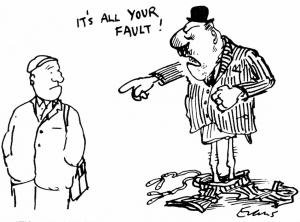 Philip James Evans was born in West Yorkshire and grew up in London, Uganda, and Scotland. His father taught English literature and his mother was an art teacher. As a teenager in Aberdeen he became active in the Youth Campaign for Nuclear Disarmament. He studied at the Sunderland Art College and the Leeds College of Art, and started drawing political cartoons as a result of his involvement in the anti-Vietnam War movement of the late 1960s. He joined the International Socialists (IS) during this period and contributed numerous illustrations, gag cartoons, and comic strips to Socialist Worker and other IS publications. During the 1970s and 1980s his eye-catching work frequently turned up in labor, tenant, and anti-war periodicals.
Philip James Evans was born in West Yorkshire and grew up in London, Uganda, and Scotland. His father taught English literature and his mother was an art teacher. As a teenager in Aberdeen he became active in the Youth Campaign for Nuclear Disarmament. He studied at the Sunderland Art College and the Leeds College of Art, and started drawing political cartoons as a result of his involvement in the anti-Vietnam War movement of the late 1960s. He joined the International Socialists (IS) during this period and contributed numerous illustrations, gag cartoons, and comic strips to Socialist Worker and other IS publications. During the 1970s and 1980s his eye-catching work frequently turned up in labor, tenant, and anti-war periodicals.
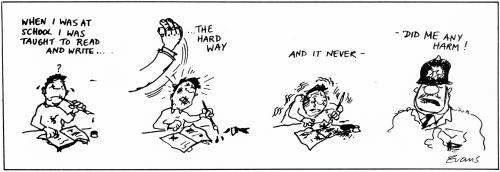
The successor organization to the IS, the Socialist Workers Party UK, published a collection of his cartoons in 1982, titled The Joke Works. His illustrations and cartoons also appeared in Trotsky for Beginners (1980), Marx’s Kapital for Beginners (1982), Ireland for Beginners (1983), Commodities: How the World Was Taken to Market (1987), The Politics of Childhood (1987), Best Pubs in London (1989), Best Pubs in Devon and Cornwall (1989), Understanding Economics (1995), More Years for the Locust: The Origins of the SWP (1997), and London for Beginners (1999). He dropped out of the SWP in the early 1980s but remained active on the left, supporting himself as a freelance cartoonist for labor movement and mainstream publications, including Tribune and the Radio Times.
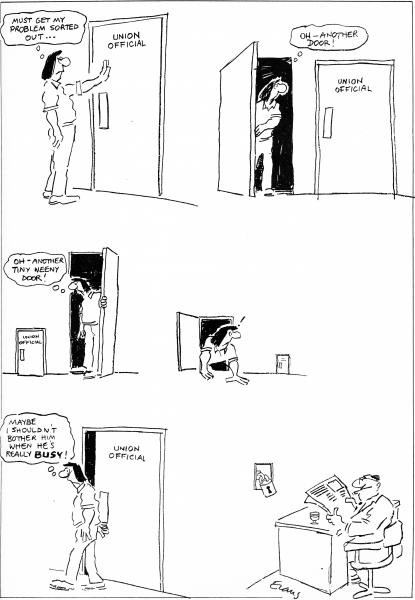

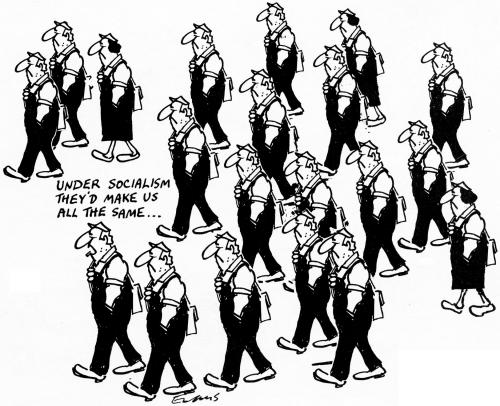
In his introduction to The Joke Works, Evans reported that, “When I was younger I wanted to be an oil painter, a portraitist. More recently I realized that to be a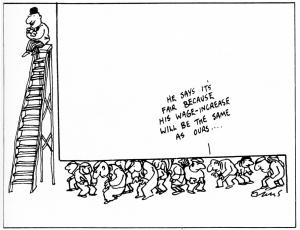 cartoonist is just as difficult—more difficult perhaps—because you have to get your hands dirty in the political fight. I have always been interested in propaganda—I’ve always felt that if you’re good at something then why not try to make a point with it? A little pamphlet, with cartoons, on the struggle of a tiny group of ordinary seamen against their right-wing union leaders, or textile workers against a sweatshop employer, is more important than the cracks on the face of an important diplomat or princess.”
cartoonist is just as difficult—more difficult perhaps—because you have to get your hands dirty in the political fight. I have always been interested in propaganda—I’ve always felt that if you’re good at something then why not try to make a point with it? A little pamphlet, with cartoons, on the struggle of a tiny group of ordinary seamen against their right-wing union leaders, or textile workers against a sweatshop employer, is more important than the cracks on the face of an important diplomat or princess.”
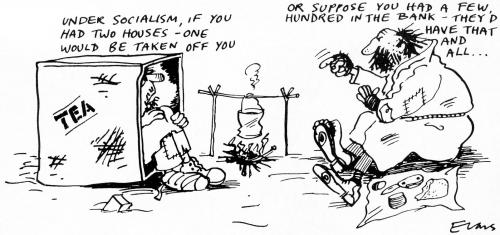
In an obituary for the Guardian, Murray Armstrong described Evans’ cartooning as “funny, concise, and uncompromisingly on the side of the exploited and the oppressed.” His style “was bold and simple, but his characters had doubts, idiosyncrasies, and conflicting ideas and attitudes.…Evans’ keen observation of the detail of everyday life gave his cartoons an edge that was neither moralistic nor dogmatic.” Armstrong also notes that he “could be difficult when disturbed at his work but usually, as one friend noted, ‘he could charm the spuds off a hungry pig.’”


Phil Evans moved from London to Hastings in the early 1990s to be close to his mother. He is survived by his sister, his brother, and his three granddaughters. He left his papers, drawings, and royalties to his eldest granddaughter.


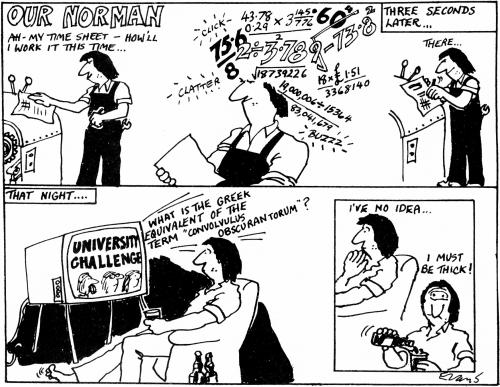



Dear Miss Evans (?) and Mr Worcester, and whoever is concerned,
This is a very personal letter about Phil Evans. I knew him well.
Please forgive me if my address to you is wrong.
My name is Angela Grooten. I live in Nijmegen, Netherlands.
(By the way: Ours was not The Bridge Too Far. That was Arnhem. But the film was shot here. I was there wile a student 1972)
This is about Phil Evans.
For 2 years we were great lovers. 1989-1991.
It was a story, that broke my heart.
It was impossible.
I still have all his love letters, so characteristically more drawn than written, complete with cartoons and pictures, quickly done by his genius.
I wonder, by the way, since you have copyright, what does that mean?
What he made for me, and gave to me, remains mine.
I will not publish it. I will not give it to anybody else.
I could write a book about Phil. And our adventures.
My letters were not bad either. I kept them too.
Of course this was a doomed passion.
Drs. Angela Grooten, NIJMEGEN The Netherlands.
Worcester’s descriptions of the Our Norman series really sum up what was critical about Evans’s 1970s political cartooning at its best: ‘The cartoon tells its story from inside the labor process, from an explicitly blue collar point of view. His work from that period anticipated a time when a confident and united working class could seize the levers of power.’ As Roger Huddle, who worked with Evans in the SWP printshop during the 1970s, recalled, ‘Norman was every worker, someone ducking and diving though the trials of work in a factory. He got one over on the bosses, kept up his union dues and took great pride in outwitting the foreman.